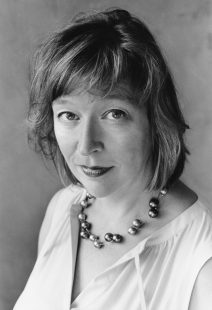***
I was unable to save a single life I couldn't stop a single bullet so I circle cemeteries that aren't there I search for words that aren't there I run to the aid uncalled for to the rescue delayed I want to get there on time even if it's already over
WE
we animals superior by our own nomination we with our disappearing tail of instincts because without them it's easier to persist in our stubborn error our opposition to nature makes her itch so she scratches herself and shudders with a tsunami, for instance then we die out a little and those who remain feel very sorry
PUSTE MIEJSCA PO
THE EMPTY PLACES AFTER
1. Tu był wysoki horyzont: biegł jak kot po dachach, przeskakując kominy. Nie ma już tej ulicy. Horyzont uciekł w pola, za Wisłę. Po domach, które tu były, zostało niebo—ciemniejsze niż naokół, jak ściana pod zdjętym obrazem. Gołębie z nawyku przelatują wyżej, a wieczorem zapala się księżyc na czwartym piętrze powietrza.
2. Noc jest pustym miejscem po dniu. Dwuwymiarowa jest ciemność. Dopiero dalekie poszczekiwanie psów z okolicznych wsi odbudowuje przestrzeń. I znów rozlegają się zagubione odległości. Gdybyś ruszył przed siebie na oślep, zdziałałbyś tyleż, co trwając nieporuszony. I tak ciemność miniesz dopiero o świcie. Ale psy—znaki czuwających wiorst—upewniają, że nie wszystko jeszcze stracone.
3. Puste miejsca po kimś nigdy nie bywają puste. Rozrastają się we wszystkich kierunkach, nie wystarcza im obszar wyznaczony dla żywych. Ten, którego już nie ma, nie mieści się w ciasnym kręgu ogarniającym go za życia. Odkąd zniknął, zamieszkuje wszystkie miejsca jednocześnie, wypełnia najbardziej niepojęte pojemności. Jego materia nieuchwytna, jego duch dotykalny zastępuje nam wszystkie drogi, staje się kretem w czarnoziemie naszych snów. I dopiero czas wypiera go z opanowanych przezeń posiadłości. Ale i wtedy miejsce nie jest puste ani przez chwilę. Kiedy milknie żywa pamięć, która jest tworzywem tych, co odeszli, ostatnia ich siedziba bywa zaorywana pod nowe sady i nowe cmentarze. Cudze sady i obce cmentarze, nie podległe naszym obrządkom.
1. Here had been a tall horizon: running like a cat across rooftops, leaping over chimneys. That street is no more. The horizon escaped into the fields, across the Vistula. What was left after buildings is sky–darker than the sky around it, like the wall beneath a removed picture. The pigeons out of habit fly higher up, and at night on the fourth floor of air the moon switches on.
2. Night is an empty place after day. Darkness is two-dimensional. Only the distant barking of dogs from nearby villages reconstructs space. And again the lost distances ring out. If you were to go forward blindly, you would get just as far as standing there motionless. Anyway you will only pass through the darkness at dawn. But the dogs—signs of the watching versts—assure that not everything is yet lost.
3. Empty places left after someone tend never to be empty. They spread out in every direction, the area designated for the living isn’t enough for them. The one who is no longer won’t fit inside the tight circle embracing him in life. Since disappearing, he inhabits all places simultaneously, fills the most incomprehensible volumes. His elusive matter, his tangible spirit replaces all our paths, it becomes a mole in the black earth of our dreams. And only time dislodges him from the places he has overtaken. But even then the place isn’t empty for an instant. After the existing memory, the substance of those who are gone grows silent, their final residence is usually plowed for new orchards and new cemeteries. Someone else’s orchards and cemeteries, not subject to our customs.

Jerzy Ficowski (1924-2006) was a poet, songwriter, and scholar on the Polish Roma population, as well as of the writer-artist Bruno Schulz. Recent translations of Ficowski’s poems have appeared in American Poetry Review, Poetry, Nation, New York Review of Books, and Ploughshares. Everything I Don’t Know, his selected poems, received Best Book of Poetry in Translation from PEN America.

Jennifer Grotz‘s most recent book of poems is Window Left Open. She is director of the Bread Loaf Writers’ Conferences.

Piotr Sommer is the author of Continued (Wesleyan University Press) and Overdoing It (Hobart and William Smith Colleges Press). His collected poems, Po Ciemku Też, (Also In The Dark) appeared in Poland in 2013.
Three poems from EVERYTHING I DON’T KNOW: SELECTED POEMS by Jerzy Ficowski, translated from the Polish by Jennifer Grotz and Piotr Sommer, published by World Poetry Books, 2021.
For the Translator’s Page archive click HERE
